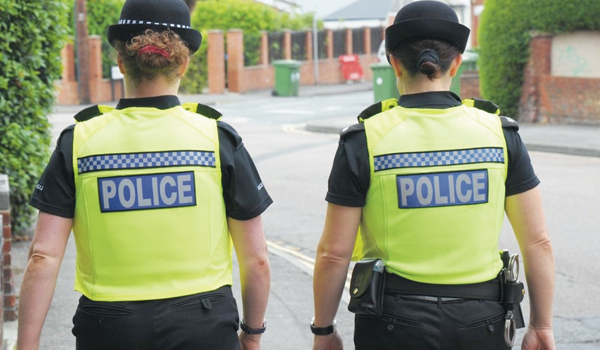Almost 1,000 police officers are operating in UK schools, figures show
Almost 1,000 police officers are operating in schools across the UK, figures show, with a charity warning of a “deeply concerning” and “normalised” police presence.
Some 979 police officers are based in schools, according to a Freedom of Information request to 45 police forces by the Runnymede Trust.
Half of Safer Schools Officers (SSOs), or their police force-based equivalents, are based in London.
Research suggests that officers are more likely to be in schools in areas with higher numbers of pupils eligible for free school meals.
Such areas are also likely to have higher numbers of black and ethnic minority students, the Runnymede Trust said.
The race equality think-tank said placing SSOs in schools “can facilitate the school-to-prison pipeline” for many black and ethnic minority young people.
The figures are outlined in a new briefing, Over-policed and under-protected: the road to safer schools.
All but seven forces responded to the data request.
It comes after figures obtained from Scotland Yard by the Children’s Commissioner showed 650 children underwent “intrusive and traumatising” strip-searches under stop and search powers by the Metropolitan Police Service (MPS) between 2018 and 2020.
Of these children, 58 per cent were described by the officer as being black, and more than 95 per cent were boys.
These were obtained following the Child Q scandal, where a black schoolgirl was strip searched by police while on her period after being wrongly suspected of carrying cannabis.
The search by MPS officers took place at the girl’s school in 2020 without another adult present.
The MPS has apologised and said it “should never have happened”.
Dr Shabna Begum, head of research at the Runnymede Trust, said: “It is deeply concerning how normalised police presence in our children’s schools is, with no question over the highly racialised and damaging impact excessive force can have inside a school setting.
“As the mother of teenage children and someone who taught in a neighbouring school to Child Q’s, I find that school’s negligence unforgivable.
“But, sadly, this is the predictable outcome when schools and policing are allowed to integrate in such intimate and unaccountable ways.”
Dr Begum said criminalisation is “traumatic”, and negative outcomes lead to a process of “alienating children and young people from the educational opportunities” they deserve.
She added that the Government has not been able to justify the value of police officers in schools.
The Runnymede Trust is calling for the Government to end the power of the police to strip search children.
It said officers should be removed from schools and also called for more funding for schools and councils so they can support and safeguard children.
Dr Remi Joseph-Salisbury, senior lecturer at the University of Manchester, said: “To truly support young people, we have to shift away from punitive interventions and invest more positively in creating supportive, caring, and nurturing environments. We have to remove police from schools.”
Geoff Barton, general secretary of the Association of School and College Leaders, said Safer Schools Partnerships can work well to keep young people and staff safe.
He continued: “To work effectively, it is imperative that they have the confidence and support of staff, parents, students and wider communities.
“They must certainly not criminalise, disproportionately police, or discriminate against groups of young people, and in light of the concerns raised by the Runnymede Trust it would be a good move for the Government to evaluate the work and effectiveness of Safer Schools Partnerships and share this information with communities, schools and police services.”
National Police Chiefs’ Council lead for children and young people, T/Deputy Assistant Commissioner Catherine Roper, said: “Policing should provide a service to everyone that is of the highest possible standard. This especially applies to children and young people – and I am so sorry if any experience you have had has impacted upon the trust and confidence you have in police officers.
“Schools officers, together with all officers whose primary role is to work with children and young people, are essential to ensure that we can provide support and guidance to pupils in schools and colleges. Officers are there to build trust and forge relationships with students and staff and empower young people to know their rights.
“I disagree with the recommendation of the report that schools officers should be withdrawn. I am keen to work with the Runnymede Trust to understand their report fully and to work together to find ways to improve upon the concerns they raise. However, officers across England and Wales are providing essential support to children and young people, and to withdraw that would be to remove an essential support for them.
“Police involvement with schools is closely monitored and agreed with headteachers and education authorities.
“We fully accept that some of our powers, like stop and search, are disproportionately applied to black communities, and we are working hard – including the full 43 force commitment to the Police Race Action Plan – to put this right.
“I have personally contacted the Runnymede Trust on the back of their report and I am delighted that they have accepted our offer to be part of our ongoing research into police officers in schools, alongside the Youth Endowment Fund.”
A government spokesman said: “Schools are legally required to work closely with local authorities, police, and healthcare professionals to safeguard and promote the wellbeing of all children in a local area.
“The deployment of individual officers is an operational decision for police forces and a matter for individual schools, working together to decide the best approach.
“We have published revised Searching, Screening and Confiscation guidance which has been updated to emphasise safeguarding policies, providing clear advice to staff and parents on how and when to safely screen or search a child.
“The guidance also provides new advice on recording searches, informing parents, and supporting the voice of the child.”


